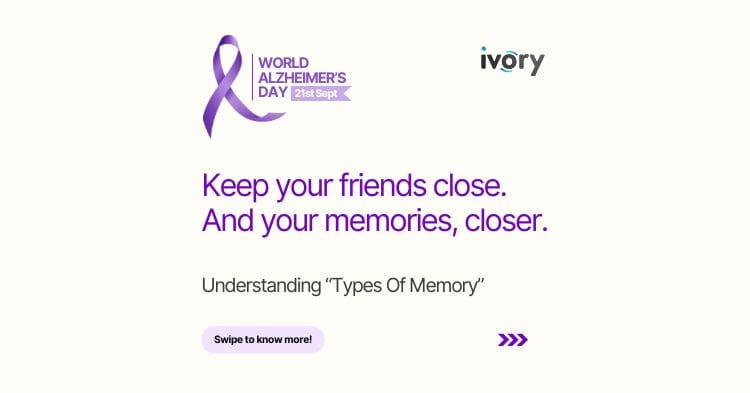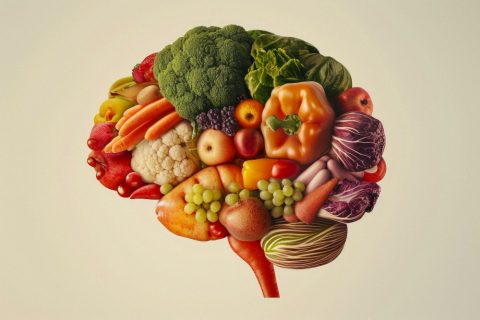Have you ever wondered how you’re able to remember your best friend’s birthday but forget where you put your keys? Or why you can hum a song from years ago but struggle to recall the details of a conversation you had five minutes ago? That’s your brain juggling different types of memory. Let’s break them down into bite-sized, easy-to-digest chunks so you can understand what’s happening upstairs!
Talking about memory this month is especially meaningful because Alzheimer’s affects something so central to who we are—our ability to remember. This World Alzheimer’s Awareness Month, we take a moment to honour those living with memory loss and reflect on how precious our memories truly are. By raising awareness, we aim to foster understanding and encourage conversations that bring comfort and support to those affected. It’s about spreading empathy and showing that every effort to remember, connect, and care deeply matters.
1. Short-Term Memory: The Brain’s Post-It Note
What it does:
Short-term memory holds onto small pieces of information for a brief moment—just enough time for you to use it and toss it. Think of it as a temporary holding space that stores around seven pieces of information (give or take a couple).
Example:
Ever remember someone’s name for a few minutes after you meet them, only to forget it later? That’s your short-term memory doing its thing.

2. Working Memory: Your Mental Juggling Act
What it does:
Working memory lets you store and work with information simultaneously. It helps you solve problems, do mental math, or plan out steps for a task. This makes it one of the most used in different types of memory.
Example:
You’re at the store with only $500 in your wallet. You mentally add up the prices of the items in your cart to ensure you don’t overspend. That’s your working memory, keeping everything in check.

3. Long-Term Memory: Your Mental Hard Drive
What it does:
Long-term type of memory is where all your long-lasting information goes, from the lyrics to your favourite song to childhood memories. This is one of the lest often used memory from the different types of memory. There are two main types:
- Episodic Memory: Memories of personal experiences (your first kiss, your graduation day).
- Semantic Memory: Facts and knowledge (like knowing that Paris is the capital of France).
Example:
Remembering the day you got your first pet falls under episodic memory while recalling that Einstein developed the theory of relativity taps into semantic memory.

4. Sensory Memory: Your Brain’s Super-Short Snapshot
What it does:
Sensory memory stores information from your senses (sight, sound, touch, etc.) for just a few seconds before it fades away. It’s super brief but helps your brain decide whether to pay attention or move on.
- Iconic Memory: Visual memory that lasts about half a second.
- Echoic Memory: Auditory memory that sticks around for a few seconds.
Example:
You catch a glimpse of a billboard while driving, and that image lingers in your brain for a moment before disappearing—that’s your iconic memory at work.

5. Non-Verbal Memory: The Power of Sights, Sounds, and Smells
What it does:
Nonverbal memory lets you recall things other than words, like images, sounds, and smells. It’s why you can remember faces or recognize a familiar tune even without lyrics.
Example:
You hear the opening notes of a classic song and instantly recognise it, or you smell cookies baking and think of your grandma’s kitchen. That’s non-verbal memory in action.

6. Contextual Memory: Connecting the Dots
What it does:
Contextual memory helps you remember where, when, and how you learned something. It’s like the backdrop that gives context to specific memories.
Example:
When someone tells you a story, you suddenly recall hearing the same thing that you heard years ago from a family member. That’s your brain connecting the dots through contextual memory.

7. Procedural Memory: Muscle Memory for the Win
What it does:
Procedural memory is all about how you do things. It’s the memory you use to perform skills automatically without thinking—like tying your shoes or riding a bike.
Example:
You hop on a bike after years and can still pedal without effort. That’s because your procedural memory kicked in, keeping that skill locked in place.

8. Auditory Memory: Remembering the Sounds of Life
What it does:
Auditory memory allows you to store and recall sounds. It’s why you can remember song lyrics, directions, or something someone just said.
Example: When you hear a song and instantly sing along, even after a long time.

9. Visual Memory: Your Brain’s Photographic Moment
What it does:
Visual memory helps you recall images, faces, and scenes. It’s essential for things like recognising people or remembering where you left your keys.
Example:
You’re trying to find your way back to a café and remember a landmark you passed. That’s your visual memory guiding you back.

10. Naming Memory: Finding the Right Word When You Need It
What it does:
Naming memory helps you remember and retrieve the correct name or label for objects, people, or places. It’s crucial for language and communication.
Example:
You run into someone at a party and instantly recall their name, or you see an animal and immediately know it’s a “giraffe.” That’s naming memory at work.

How Can You Boost Your Memory?
Memory isn’t something you’re stuck with—it’s a skill you can strengthen. Here are a few tips to keep your brain sharp:
- Chunk Information: Break things into smaller, manageable parts (like remembering a phone number as 123-456-7890 instead of a long string of digits).
- Stay Mentally Active: Puzzles, brain games, and learning new things can keep your brain on its toes.
- Get Plenty of Sleep: Memory consolidation happens while you sleep, so catching enough Z’s is crucial.
- Practice Mindfulness: Staying present helps you focus better, which improves memory retention.
So, the next time you wonder why you remember certain things but not others, know that different types of memory are at play. Whether it’s remembering a friend’s birthday or recalling the smell of a favourite dish, your brain is always working behind the scenes to keep those memories close. Also this should help: Find your cognitive age
What type of memory do you rely on the most? Write to us at [email protected]




